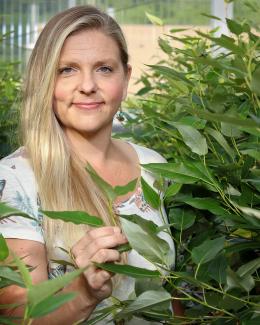Abstract
Plant metabolic acclimation to thermal stress remains underrepresented in current global climate models. Gaps exist in our understanding of how metabolic processes (i.e., photosynthesis, respiration) acclimate over time and how aboveground versus belowground acclimation differs. We measured the thermal acclimation of Populus trichocarpa, comparing aboveground versus belowground physiology over time. Ninety genetically identical ramets were propagated in mesocosms that separated root and microbial components. After establishment at 25°C for 6 weeks, 60 clones were warmed +4 or +8°C and monitored for 10 weeks, measuring photosynthesis (A), leaf respiration (R), soil respiration (Rs), root plus soil respiration (Rs+r), and root respiration (Rr). We observed thermal acclimation in both A and R, with rates initially increasing, then declining as the thermal photosynthetic optimum (Topt) and the temperature-sensitivity (Q10) of respiration adjusted to warmer conditions. Photosynthetic acclimation was constructive, based on an increase in both Topt and peak A. Belowground, Rs+r decreased linearly with warming, while Rs rates declined abruptly, then remained constant with additional warming. Plant biomass was greatest at +4°C, with 30% allocated belowground. Rates of mass-based Rr were similar among treatments; however, root nitrogen declined at +8°C leading to less mass nitrogen-based Rr in that treatment. The Q10-temperature relationship of Rr was affected by warming, leading to differing values among treatments. Aboveground acclimation exceeded belowground acclimation, and plant nitrogen-use mediated the acclimatory response. Results suggest that moderate climate warming (+4°C) may lead to acclimation and increased plant biomass production but increases in production could be limited with severe warming (+8°C).




